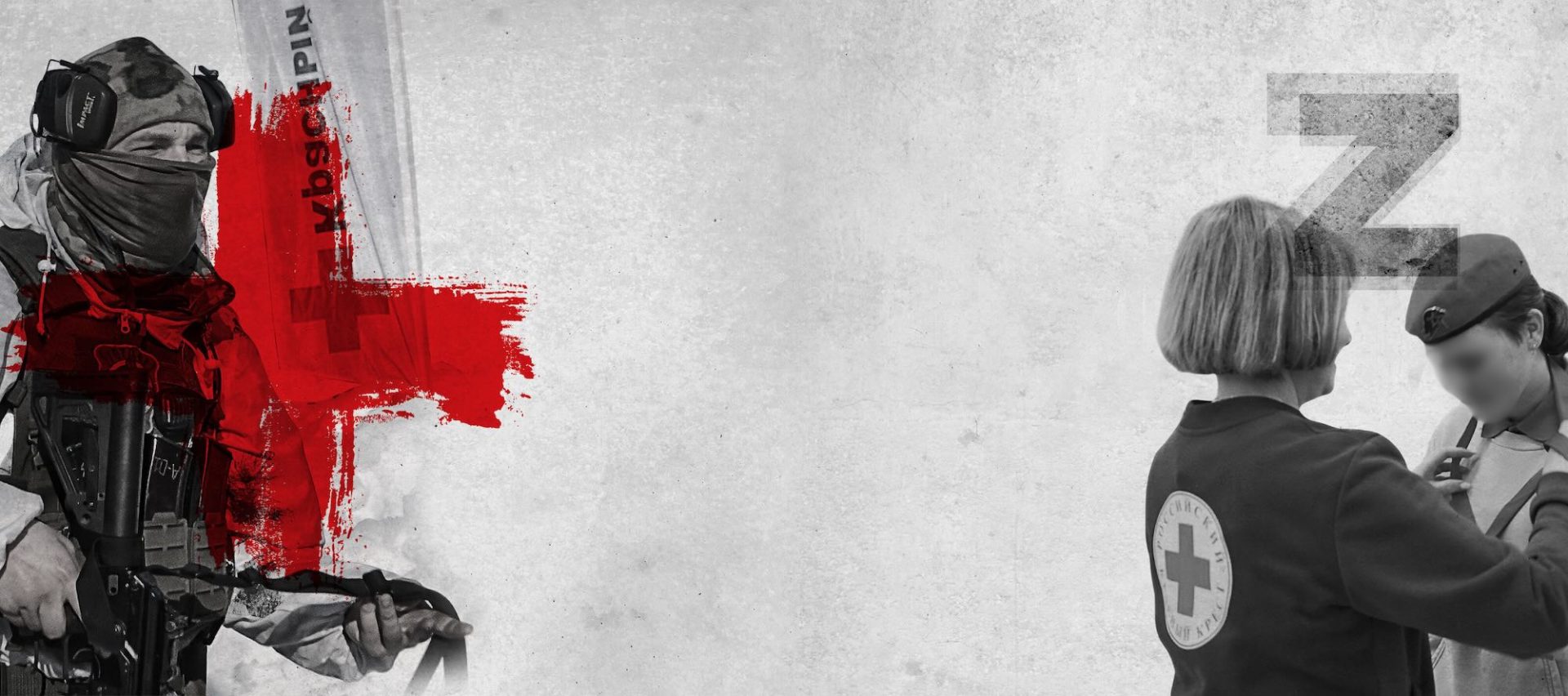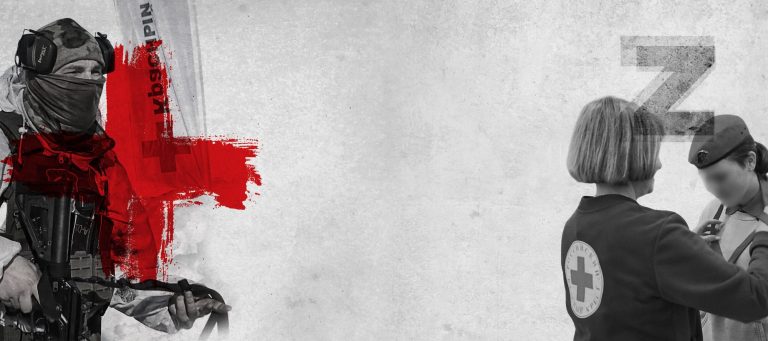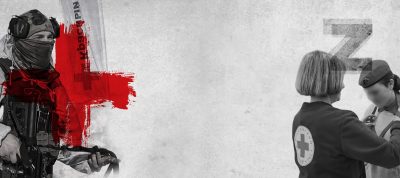Jonas Halbe, Carina Huppertz, Frederik Obermaier, Timo Schober (Paper Trail Media)
Illustration: Mart Nigola (Delfi Estonia)
Jonas Halbe, Carina Huppertz, Frederik Obermaier, Timo Schober (Paper Trail Media)
Illustration: Mart Nigola (Delfi Estonia)
Two weeks after the revelation that the Russian Red Cross (RRC) has close ties to the Kremlin’s war and propaganda machinery, pressure is mounting on the International Federation of the Red Cross (IFRC) as several top donors and key governments publicly voice concern about the findings.
Meanwhile, new evidence highlights how the RRC entered an official partnership with an organization that is under Western sanctions for “re-educating” children that Russia has deported from occupied Ukraine. The RRC also routinely engages with Russia’s patriotic military camps, which teach children as young as 8 how to fire Kalashnikov automatic rifles and participate in close-combat.
At the end of February, VSquare and our international partners revealed Vladimir Putin plans to oust the International Red Cross from the occupied territories in Ukraine and replace it with Russian offshoots loyal to the Kremlin.
Our “Kremlin Leaks” investigation also uncovered that several board members of the RRC openly support the war against Ukraine. The supposedly neutral aid organization honored arms companies and, at least up until he was asked about it by “Kremlin Leaks” reporters in February, RRC president Pavel Savchuk was actively working with several sanctioned propaganda organizations, all of which support soldiers on the frontline with weapons, equipment, and money.
Savchuk, who also sits on the governing board of the IFRC, is a member of the “central staff” of the All-Russian People’s Front. This organization, sanctioned for its propaganda efforts, was established by Russian President Vladimir Putin. It is known for various activities, including holding the trademark rights to the “Z,” a symbol associated with Russia’s war of aggression against Ukraine.
A US State Department spokesperson characterized the “Kremlin Leaks” findings as “extremely concerning” and said the State Department has been in touch with the IFRC regarding the issues we reported on through the US mission to the United Nations.
The Swedish Ministry of Foreign Affairs – another key donor to the International Federation of the Red Cross – said in a statement that it has been in contact with the IFRC since the publication of the “Kremlin Leaks” revelation “to discuss the issues raised together with other donors.”
“Full clarity on these issues is now needed. We expect the IFRC to take swift action in accordance with its constitution, which includes measures such as suspension or expulsion [of the RRC],” a Swedish ministry spokesperson said.
The British government is also following developments after the revelation. “We have been assured that none of our aid has been channeled to [the Russian Red Cross] in 2022, or at any point since Russia’s illegal invasion of Ukraine,” a UK Foreign Office spokesperson said, adding that the office awaits the outcome of the Red Cross Movement’s investigations into these allegations.
The IFRC, at the same time, has opted to keep a low profile on this issue. So far, it has said only that it is reviewing the claims against the RRC and its president, Savchuk, but the IFRC has not elaborated as to what that review will mean. The IFRC has also stressed that a review is not an official investigation, which would be conducted by the organization’s compliance and mediation committee.
While the IFRC continues its review of the connections and official cooperation between the Russian Red Cross and several Russian organizations that are actively engaged in promoting Putin’s war efforts against Ukraine, VSquare and its partners – including Delfi (Estonia), Expressen (Sweden), Der Spiegel, ZDF and Paper Trail Media (Germany), Der Standard (Austria), Tamedia group publications (Switzerland), YLE (Finland) and the Guardian (UK) – can now reveal new information that shows the connection between the RRC and Russia’s war and propaganda network go even deeper than previously thought. These new revelations raise additional concerns about the organization’s compliance with the principles of neutrality and impartiality.
In January 2024, Pavel Savchuk, chairman of the Russian Red Cross, signed a cooperation agreement with the Artek children’s camp on the annexed Crimean peninsula. Both RRC and Artek’s websites boast pictures of Savchuk and Artek director Konstantin Fedorenko signing an agreement that entails “an important step in strengthening cooperation in the education of young people” and “unlocking the potential of future leaders and citizens in a responsible society.”
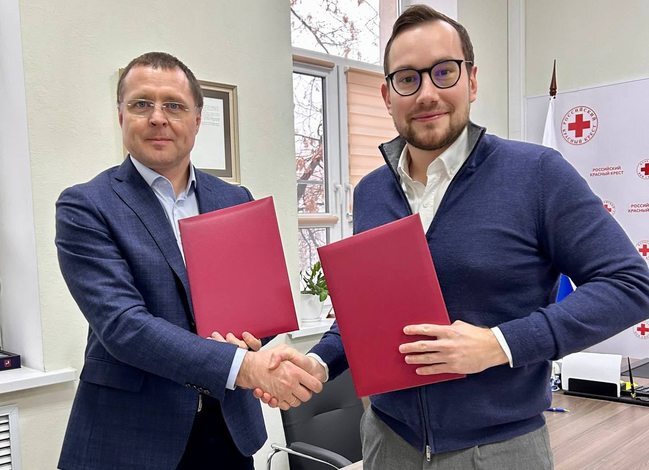
Russian Red Cross President Pavel Savchuk with Konstantin Fedorenko
The Russian government-owned Artek is not exactly a regular children’s camp. It has been widely accused of detaining children whom Russia deported from the occupied areas of Ukraine. Fedorenko, the man photographed shaking hands with Savchuk when signing the cooperation agreement, has been sanctioned by the European Union, the United Kingdom and the United States for his involvement in the abduction of Ukrainian children and for organizing Russian military and patriotic camps for them.
According to the US State Department, the Russian government-owned Artek “summer camp” receives Ukrainian children who are subsequently placed in extensive “patriotic re-education programs and are prevented from returning to their families.”
Both Russian President Vladimir Putin and Russian Commissioner for Children’s Rights Maria Lvova-Belova are wanted by the International Criminal Court in The Hague for war crimes specifically for the abduction of Ukrainian children.
When approached for a comment, Savchuk directed all media inquiries to the RRC press department and abruptly ended the phone call. Our following emails were left unanswered.
IFRC, for its part, said that it was not in a position to comment on this or other new findings detailed in this story. “This information will be added to the claims we are reviewing before deciding on our next steps,” the IFRC said.
The Yale School of Public Health’s Humanitarian Research Lab has identified Artek as one of the camps that is preventing Ukrainian children from returning home during the war. “Parents also described being unable to get information about their child’s status or whereabouts after their return had been suspended,” the Conflict Observatory report stated.
Artek organizes children’s camps in cooperation with Russian authorities and government organizations like the Youth Army (Yunarmia), the attorney general’s office, as well as the Special Investigative Committee, the Prison Authority, and the Black Sea Fleet College.
As revealed in a previous “Kremlin Leaks” investigation, the ultra-patriotic Youth Army movement is officially supported by the Russian Ministry of Defense and receives funding from the federal budget — specifically, from a secret section of the budget designated for the “information war.”
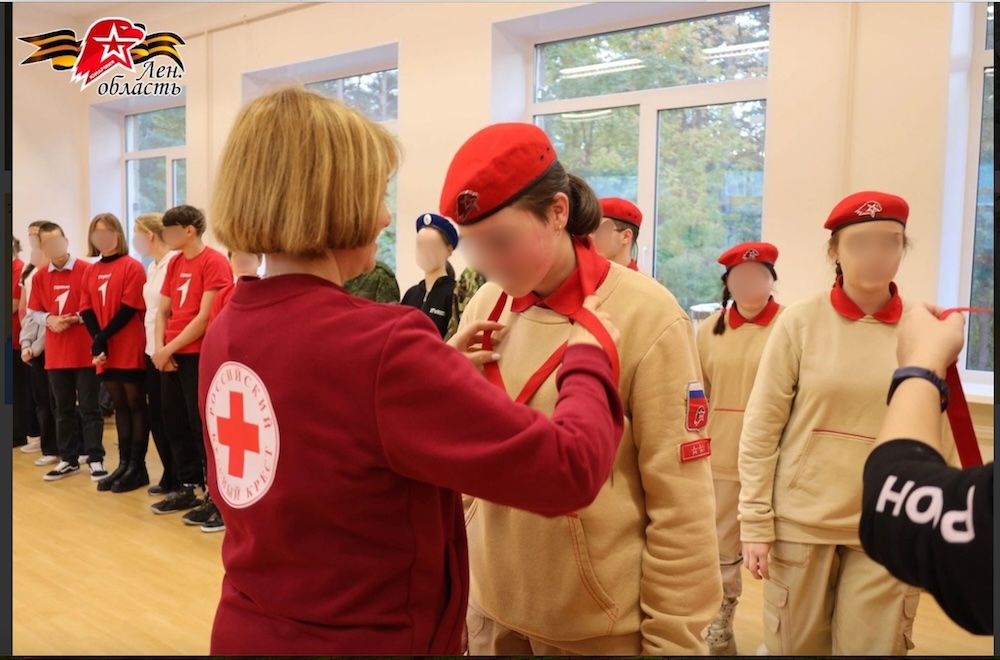
An employee of the Russian Red Cross gives a medal to a member of the Youth Army used by the Kremlin for the patriotic education of Russian children.
When the US placed sanctions on the Youth Army in April 2023, it described it as “an initiative created by Russia’s Defense Minister Sergei Shoigu responsible for militarizing and propagandizing schoolchildren in occupied areas of Ukraine.”
One of the courses that the Youth Army organizes jointly with the ministry of defense on Artek’s premises in Crimea is called “Future Commanders.” According to the Conflict Observatory report, about 50 Ukrainian children participated in the camp, where they handled military equipment, drove trucks, and studied firearms.
The report cited one of the organizers as saying that the goal of the camp was to foster “patriotism and love for the [Russian] homeland” and that visiting Youth Army functionaries taught the children about the “concept of Motherland and the requirements to the future defenders of the Fatherland.”
A large-scale militarization of society has been underway in Russia for years, starting as early as primary school. Thousands of military-patriotic clubs, summer camps, and schools are in place throughout the country to ensure that Russian children are loyal to Vladimir Putin’s regime and the Russian military.
The Youth Army, with its hundreds of thousands of members, is one of the largest such organizations. The participating children, the youngest of whom are just eight years old, dress up in khaki uniforms and red or blue berets decorated with the eagle and red star emblem of the movement.
A fundamental part of the movement revolves around weapons, shooting, and other military training, but it also features medical care. The Russian Red Cross regularly participates in these military training camps for children.
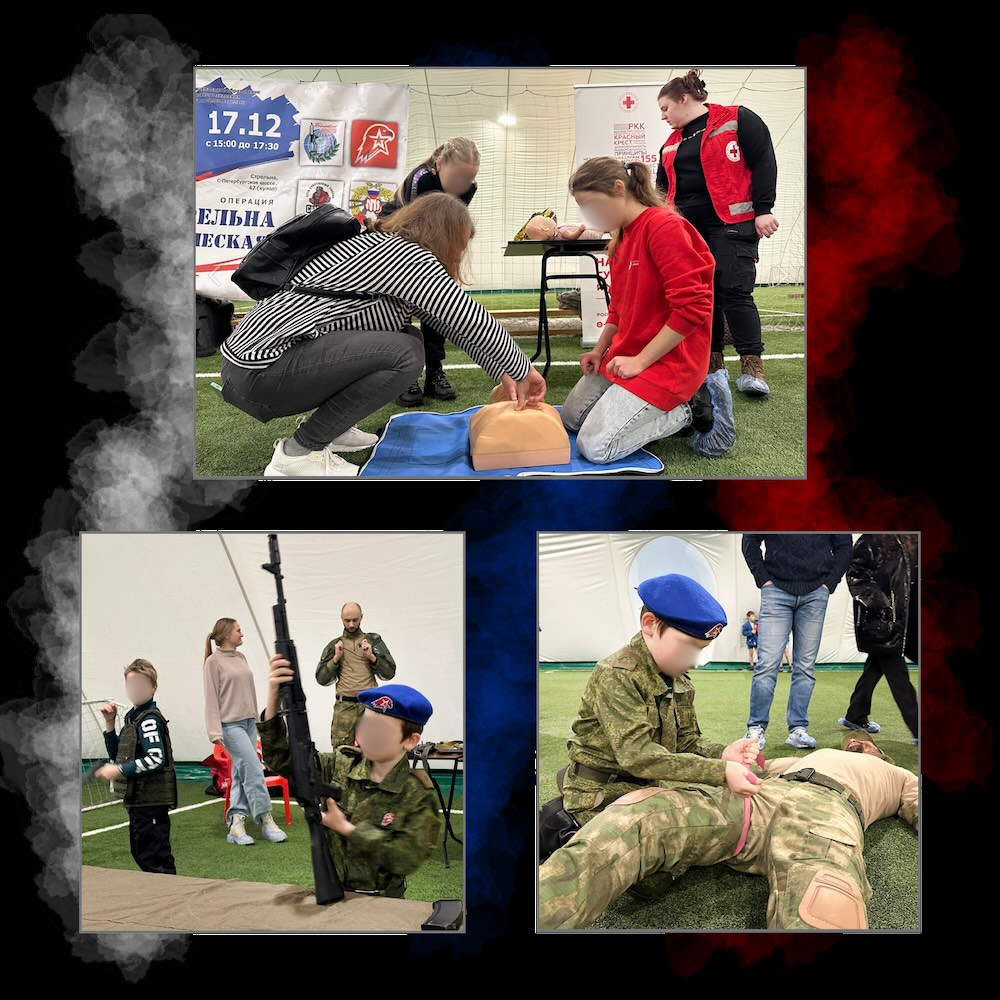
A child wearing the Youth Army’s blue beret gets training in weapon handling. At the same time, the Red Cross demonstrates medical care.
In the pictures, Red Cross representatives clad in their symbolic red and white vests stand side by side with men wearing camouflage, teaching young children how to shoot with Kalashnikovs. It is not a one-time mishap – we have found dozens of examples of such events from Sosnovy Bor at the Gulf of Finland not far from Russia’s border with Estonia, up to Kamchatka at the Bering Sea across from Alaska.
In the city of Khanty-Mansiysk, a “military-patriotic” camp called “Children’s spetsnaz,” named after the notorious Russian special forces, is held every summer. The camp revolves around a romanticized image of Russian soldiers and war. The summer camp has a guard tower and armed men at the entrance “making it look like a real regiment,” as they say in a YouTube commercial for the camp.
The “spetsnaz children” practice hand-to-hand combat with a knife, shooting with Kalashnikov assault rifles and running obstacle courses. Here, too, the Russian Red Cross has been involved, training the children-spetsnaz in first aid. The camp photos show Red Cross staff with small children in camouflage uniforms.
A military-patriotic club Kaskad held a training together with the “Battle Brotherhood” organization in Moscow this February. The training featured Russian military veterans as instructors. The participants were children aged from eight to nine years, most of them dressed in camouflage clothing.
In the photos from the training, children pose with the Red Cross staff. Two Kalashnikov rifles lay on the table in front of them.
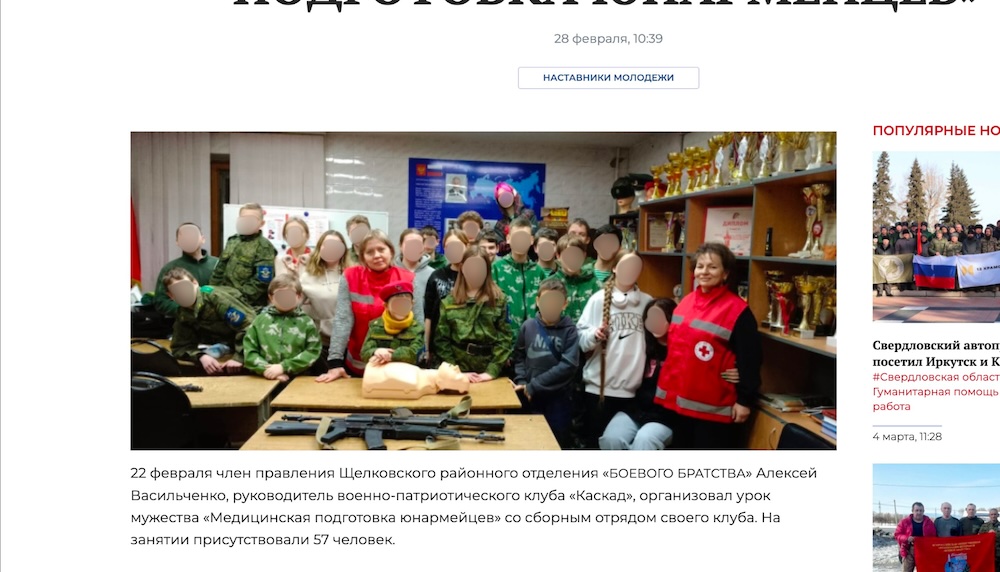
Photo from the website of the Battle Brotherhood, showing a training session with Red Cross staff.
Neither the RRC nor the IFCR responded to inquiries asking how appropriate and compliant such actions are with the Red Cross’s principles. Soon after submitting the media inquiry to the IFCR, including one question specifically asked about the RRC employees posing at the “Battle Brotherhood’s” camp with children and Kalashnikov rifles, the brotherhood’s website removed the specific photo and replaced it with a generic emblem of the organization.
Similarly, the All-Russian People’s Front removed information about Savchuk’s position in its central staff shortly after Ihe international Red Cross received an inquiry about it from our “Kremlin Leaks” reporters.
According to the IFRC statutes, violations of the principles are to be investigated by the Compliance and Mediation Committee, chaired by Kristiina Kumpula from Finland.
Last year, the IFRC was confronted with the questionable behavior of another member organization. Only a short time after it became known that the Belarusian Red Cross was involved in the abduction of Ukrainian children, an official investigation was launched by the committee led by Kumpula and, just a few months later, the Belarusian Red Cross chapter was suspended from IFCR.
The case of the Russian Red Cross, however, may not be quite so simple. The IFRC would have to take action against the national branch of a warring party. It may fear for the access of International Red Cross employees to prisoners of war held in Russia, and risk cutting off a communication channel to Moscow.
Kumpula told VSquare and our partners that the IFCR is currently “looking into the claims” about the RRC and is also seeking information from the Russian chapter. She nevertheless did not reveal which body in the IFCR is conducting that review. “Once the clarification is completed, decisions will be made on how to proceed in the matter,” she said.
“Kremlin Leaks” is a series of articles based on documents leaked from the Russian presidential administration’s so-called domestic political bloc, led by Sergey Kiriyenko. In the series’ opening installment, we detailed the Kremlin’s efforts to secure Vladimir Putin’s victory in the upcoming presidential election through extensive propaganda funding and its engagement in an information war against its own citizens. A day later we revealed how the Red Cross became part of the Russian propaganda machine.
The leaked files, the most recent of which date back to December 2023, were obtained by Estonia’s Delfi. These documents were shared for joint investigation with VSquare and Frontstory.pl (Poland), Expressen (Sweden), Meduza and iStories (independent Russian outlets), Paper Trail Media, Der Spiegel and ZDF (Germany), Der Standard (Austria), Tamedia publications (Switzerland), YLE (Finland), and The Guardian (UK).
Subscribe to Goulash, our original VSquare newsletter that delivers the best investigative journalism from Central Europe straight to your inbox!
Head of the investigative desk at Delfi Estonia, Holger Roonemaa has extensively investigated topics related to national security, including Russia’s espionage, interference, and influence operations in Estonia and the wider region. He is a member of the International Consortium on Investigative Journalists (ICIJ). Estonia’s national media association named him the journalist of the year in 2020 and 2021.

